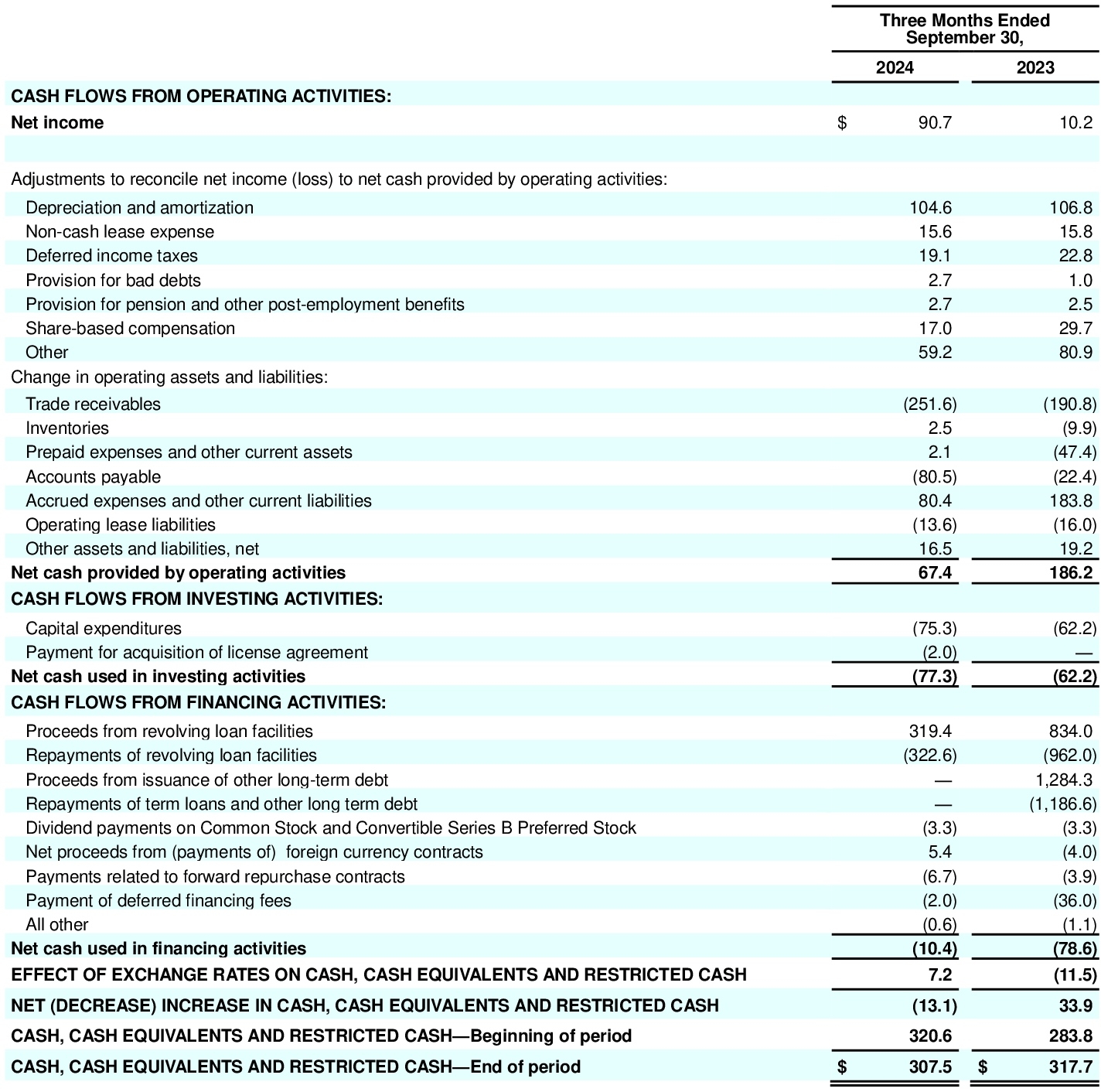Coty Reports Solid Q1 Growth Fueled by Prestige Fragrances, Outperforming Beauty Market
SHARE WITH :
Press release IMAGES
Q1 Sales Inline with Pre-Announcement, With 2% Reported and 4.5% LFL Growth
Strong Gross Margin Expansion And Sustained Brand Investments
Reiterated FY25 EBITDA Underpinned by Accelerating Actions to Adapt Coty for Future Success
NEW YORK - November 6, 2024 -- Coty Inc. (NYSE: COTY) (Paris: COTY) ("Coty" or "the Company") today announced its results for the first quarter of fiscal year 2025, ended September 30, 2024. The Company delivered continued sales and gross margin expansion in the first quarter, while continuing to invest behind its brands for the long term and execute across its strategic growth pillars.
In 1Q25, Coty's net revenues grew 2% on a reported basis and included a 1% headwind from FX and a 1% headwind from the divestiture of the Lacoste license. Coty's Q1 net revenues grew 4.5% on a LFL basis, despite the very elevated comparison of the prior year, when Coty's LFL revenues grew 18%. The Q1 reported sales growth was supported by strong growth in fragrances across all price points, including prestige, ultra premium and mass fragrances, while some slowing in the mass cosmetics market and active order management by retailers pressured sales for both mass and prestige cosmetics. LFL revenue growth on a company-wide basis and in the Americas region includes a contribution of 1% and 2%, respectively, from Argentina, which experienced hyperinflation.
Prestige Q1 net revenues increased 5% on a reported basis, including a 2% negative impact from the divestiture of the Lacoste license, with net revenues growing at a strong 7% pace on a LFL basis, including very strong growth in prestige fragrances, which grew 6% as reported and 9% LFL. Prestige reported net revenue growth in Q1 was driven by solid growth in the underlying fragrance category and Coty's brand performance, with double-digit LFL growth in the majority of Coty's leading fragrance brands, despite lapping the very robust double-digit percentage growth Coty's Prestige fragrance business in the prior year quarter.
Consumer Beauty Q1 net revenues declined 3% on a reported basis, reflecting a 3% headwind from FX, with LFL net revenues flat year-over-year off of elevated prior year comparisons when Consumer Beauty grew 10% LFL. In 1Q25, Consumer Beauty reported net revenues grew strongly in mass fragrance and mass skincare, partially offsetting declines in body care and mass cosmetics reported net revenues. For cosmetics, the weakness was concentrated in the U.S. mass color cosmetics market which was further exacerbated by significant channel shifts, resulting in Coty's U.S. Consumer Beauty sell-in tracking well below sell-out.
By geography, EMEA net revenues increased 8% on both a reported basis and LFL basis. The reported net revenue growth in EMEA was driven by continued growth across nearly all markets and the Travel Retail channel in combination with a 2% FX benefit partially offset by a 2% headwind from the divestiture of the Lacoste license. Q1 Americas net revenues declined 2% on a reported basis, but grew solidly by 4% on a LFL basis in 1Q25. The decline in reported net revenue in Americas reflected growth in Mexico and South America, and the regional Travel Retail channel, offset by lower U.S. Consumer Beauty sales, a 5% negative impact from FX and a 1% headwind from the divestiture of the Lacoste license. In Q1, Asia Pacific net revenues declined 5% on both a reported and LFL basis, primarily driven by the ongoing difficulty in the Chinese mainland market and the Asia Travel Retail channel coupled with a 1% headwind from the divestiture of the Lacoste license, partially offset by a 1% benefit from FX.
Coty delivered continued very strong gross margin expansion in the quarter. 1Q25 reported and adjusted gross margin of 65.5% increased 200 basis points year-over-year. Coty's Q1 reported gross margin improvement was mainly driven by the benefit from premiumization, pricing actions, easing inflation, excess & obsolescence reduction and supply chain savings.
Coty generated reported operating income of $237.8 million, up 20% year-over-year, supported by growth in sales and gross profit, resulting in 220 basis points of reported operating margin expansion to 14.2%. Coty's Q1 adjusted operating income of $303.6 million was roughly flat year-over-year resulting in an adjusted operating margin of 18.2%, which was slightly lower year-over-year as Coty continued to invest behind its brands as well as the timing of certain operating expenses.
Q1 reported net income of $79.6 million increased from a net loss of $1.7 million in the prior year, which drove a reported net income margin of 4.8%, up 490 basis points year-over-year. Adjusted net income of $128.1 million increased from $74.1 million with a margin of 7.7%, up 320 basis points year-over-year. The increase in both reported and adjusted net income reflects the $24 million discrete one-time non-cash tax impact to the prior year quarter, as well as a lower impact from the equity swap mark-to-market than in the prior year.
Q1 adjusted EBITDA of $360.1 million was flat year-over-year, with an adjusted EBITDA margin of 21.5%.
In Q1, cash flow from operating activities was $67.4 million and free cash outflows totaled $7.9 million. Q1 cash from operating activities and free cash flow was pressured by the phasing of order placement made by retailers, which took place at the end of the quarter and resulted in higher receivables at quarter end, as well as the phasing of payables. Total debt at the end of the first quarter totaled $4,002.2 million, while financial net debt totaled $3,718.6 million. This drove the total debt to net income ratio to 21.1x and the financial leverage ratio (net debt to adjusted EBITDA) to 3.4x, a reduction of 0.4x versus a year ago. Coty’s retained 25.8% Wella stake was valued at $1,085.0 million at quarter-end, supporting economic net debt of $2,633.6 million.
Updates on Strategic Pillars
- The prestige fragrance market remains an outperforming category in beauty, even as growth has moderated by a couple of percentage points exiting Q1 from the low double digit percentage growth in FY24 and the early part of Q1. Coty's prestige fragrance portfolio performed strongly, particularly in the EMEA and Americas regions, and the Company's very strong growth in prestige fragrances, which grew 6% as reported and 9% LFL. In the United States, Coty's sell-out and sell-in growth was impacted by the very elevated comparisons of the prior year, which included the blockbuster launch of Burberry Goddess, Coty's biggest launch ever. In Q1, reported net revenue for the majority of Coty's leading prestige fragrance brands grew by a double-digit percentage. Coty continued to grow the Burberry Goddess franchise, which contributed to the to the Burberry brand's strong double-digit percentage reported net revenue growth. Marc Jacobs Daisy Wild and Cosmic Kylie Jenner remained top ranked fragrance innovation in their launch markets, reinforcing Coty's position as a leader in fragrance. In prestige cosmetics, Coty brands Burberry and Kylie Cosmetics each grew strongly in the quarter, while Gucci makeup declined due to weakness in the Chinese mainland and Asia Travel Retail.
- The global mass beauty market continues to grow at a low-single-digit pace, with outperformance by the mass fragrance category which is growing at a high-single-digit percentage, confirming that consumers continue to prioritize the fragrance category across price points. In Q1, Coty's mass fragrances outperformed the category, growing reported net revenues by a strong double-digit percentage fueled by adidas, Nautica, Beckham and Mexx, and Coty will continue to focus on amplifying its mass fragrance offerings to capture market share in this attractive category. At the same time, the global mass cosmetics category has decelerated to flattish performance, with moderate unit growth, and was further exacerbated by significant channel shifts, resulting in Coty's U.S. Consumer Beauty sell-in tracking well below sell-out. Coty's Consumer Beauty e-commerce sales grew at a mid-single-digit percentage, ahead of the overall beauty market, as Coty continued to gain share in this critical channel. Coty social media advocacy strategy maintained momentum, with strong earned media value results for viral Consumer Beauty innovations including CoverGirl Simply Ageless Skin Perfector Essence, CoverGirl Eye Enhancer 3D mascara and Rimmel Thrill Seeker Extreme mascara.
- Coty continued to fuel its skincare strategy. Lancaster delivered mid-single-digit percentage net revenue growth as it kicked off the brand's revamp in Europe, supported by its unique positioning as the photo-aging prevention and repair expert, the launch of its Golden Lift skincare range, and the expansion of Ligne Princiere into the European market. For Philosophy, active engagement with dermatologists and influencers, aided by its newly opened influencer studio in New York, resulted in over 70% growth in the brand's earned media value. Orveda continued to expand its footprint with the opening of the La Maison Orveda in New York City, the next step in its brand building and distribution expansion.
- The e-commerce channel remains a strong growth channel for both Prestige and Consumer Beauty, and across all major regions. Coty e-commerce reported net revenues grew by a mid-single-digit percentage in Q1. As a result, e-commerce penetration increased approximately 40 basis points year-over-year to nearly 20% in Q1, with e-commerce penetration growth in both divisions. Coty's Prestige and Consumer Beauty brands continued to gain strong market share in the e-commerce channels in which the brands are present.
- The Company maintained strong momentum in growth engine markets and channels. Results in Coty's growth engine markets, which account for approximately 21% of total sales in Q1, continued grow strongly with low-single-digit percentage reported net revenue growth and double-digit percentage LFL net revenue growth, led by strength in LATAM, Africa, Southeast Asia, including India and North Asia. LFL growth in Q1 in Coty's growth engine markets includes a 5% contribution from Argentina, which experienced hyperinflation. Coty's global Travel Retail channel, which accounts for 9% of the Company's sales in Q1, continued to expand led by the Americas and EMEA, despite pressure in the Asia Travel Retail corridor.
- Coty continued to make progress on its sustainability agenda. Earlier this week, the Company published its FY24 Sustainability Report, which included key milestones, such as achieving a significant 65% reduction in Scope 3 air freight emissions versus the 2019 baseline, establishing ambitious new targets for sustainable packaging and water withdrawal, rejoining the Ellen MacArthur Foundation as a Network Member and achieving gender balance in leadership target ahead of its 2025 commitment.
Commenting on the operating results, Sue Nabi, Coty's CEO, said:
"As we enter FY25, the macroeconomic environment remains as complex as ever and the outsized growth of the last few years is now entering the normalization phase. Nevertheless, one thing is very clear: consumers continue to prioritize beauty in their spending routines, even as they pull back on many other consumer segments. And within the broader beauty backdrop, fragrances remain a top performing category. As a beauty leader, and increasingly as a beauty trendsetter, Coty remains at the forefront of fueling consumer desire and driving category growth through disruptive launches, new and improved formulations, and engaging activations and campaigns.
First, we continue to deliver sustained LFL sales growth. In fact, we are further building on our multi-year track record of outperformance. We have delivered LFL growth which is ahead of the leading global beauty players in 9 out of the last 13 quarters. This confirms that our growth is a result of our clear strategic vision, strong execution and our ability to seize on and develop beauty trends in each of our core categories. This strong operational and financial execution has been recognized by stakeholders, as we have achieved 11 consecutive financial upgrades from rating agencies since 2021.
Second, the fragrance market remains robust and remains a top performing category in beauty, with more consumers entering the category, using fragrances more often, and exploring with a variety of concentrations and formats. This reinforces our view that the structural drivers for the category will allow it to continue to grow inline to ahead of the underlying beauty market in the coming quarters and years. At Coty, as we continue to leverage our best-in-class end-to-end fragrance expertise and to set the trends in the industry, we are reinforcing our leadership in prestige fragrances while simultaneously unlocking more opportunities across the full price spectrum ranging from mass and masstige fragrances, all the way up to ultra premium and niche fragrances. In Q1, we delivered robust sales growth in each of these fragrance price tiers.
Third, we are step-changing our efforts to adapt Coty for future success in the ever more dynamic market environment. We are accelerating existing plans and adding new initiatives across all parts of the organization, whether its establishing centers of excellence for various operations, accelerating our speed to market, adapting our organizations for the increasingly omnichannel world, and maximizing the benefits of emerging technologies and artificial intelligence. Not only will these efforts enable Coty to lead in the beauty market of tomorrow, but they are also bringing additional savings in FY25 and beyond, supporting our ability to deliver our FY25 adjusted EBITDA target of close to double-digit growth.
Fourth, we will continue to play the full range of our brands and categories to capture growth opportunities and support sustained outperformance. We continue to grow our footprint across growth engine markets, expand our product range and distribution across skincare, prestige cosmetics, mass fragrances and ultra premium fragrances, and capture share in growth channels like e-commerce and travel retail.
And finally, as we continue to deliver strong profitability and free cash flow in FY25 and beyond, we will deploy this cash toward shareholder returns, further deleveraging, and amplifying Coty’s growth trajectory.
As we strengthen our position as a global beauty powerhouse, acting with the agility of smaller brands but also creating the beauty trends of today and tomorrow, Coty remains one of the most compelling investment opportunity in our industry."
1 For Scope 1 and 2 emissions.
* Adjusted financial metrics used in this release are non-GAAP. See reconciliations of GAAP results to Adjusted results in the accompanying tables.
** E-commerce penetration and contribution based on countries where e-com info is available covering approx. 86% of total Coty. Sources: Circana (Prestige) and Nielsen (CB) August 2024. Additionally, the data includes estimated data for Brick and Click sales, which is subject to change.
RESULTS AT A GLANCE
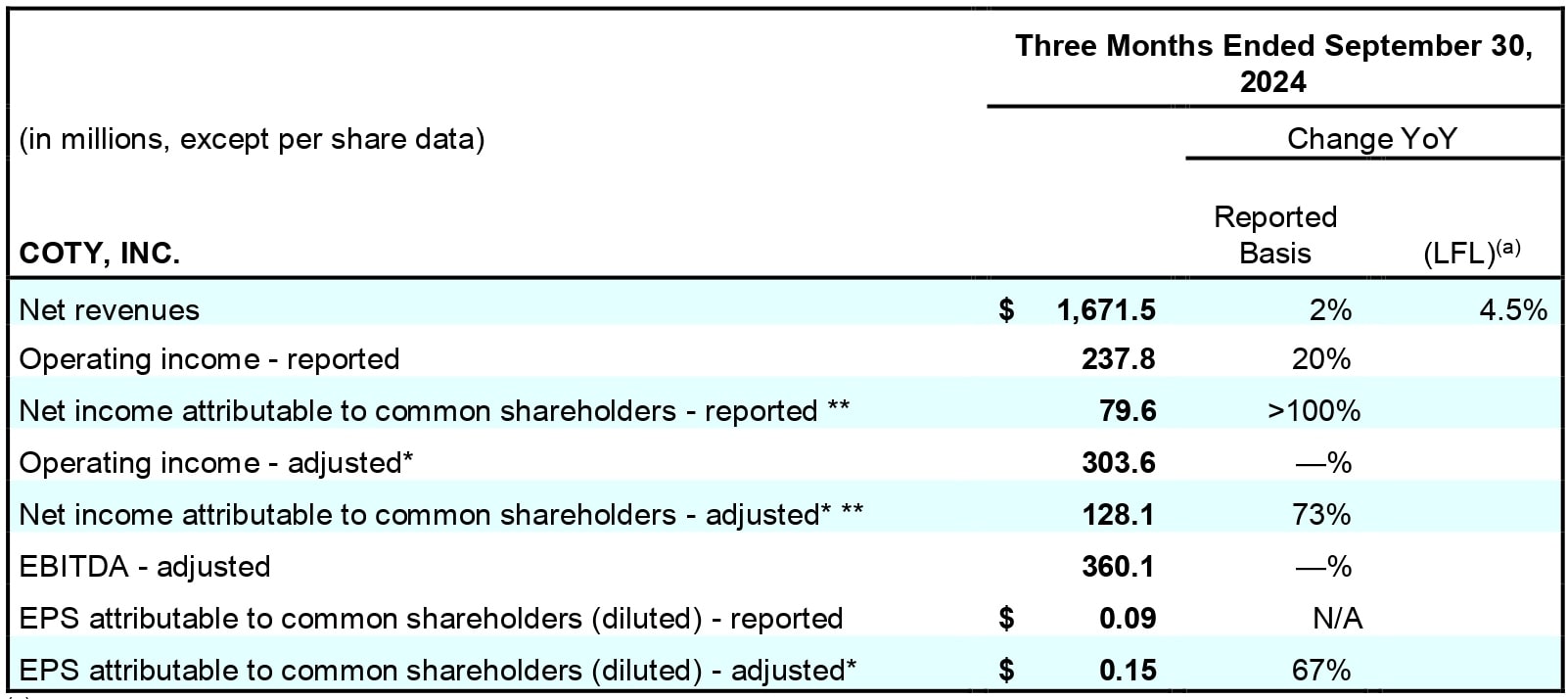
(a) LFL results for the three months ended September 30, 2024 include 1% help from Argentina resulting from significant price increases due to hyperinflation.
* These measures, as well as “free cash flow,” “adjusted earnings before interest, taxes, depreciation and amortization (adjusted EBITDA),” “financial net debt,” and "economic net debt" are Non-GAAP Financial Measures. Refer to “Non-GAAP Financial Measures” for discussion of these measures. Reconciliations from reported to adjusted results can be found at the end of this release.
** Net income for Coty Inc. is net of the Convertible Series B Preferred Stock dividends.
Outlook
Over the last several months, the beauty market has maintained solid momentum, though growth has moderated from the outsized double-digit growth of the last few years. Prestige fragrances remain an outperforming category, though growth has moderated by a couple of points exiting Q1. Mass beauty is now growing in the low single digits, with flattish performance in the mass cosmetics category. Within this backdrop, slower end demand and significant channel shifts in U.S. mass beauty and in Asia, are continuing to weigh on order levels into Q2, with sell-in tracking well below sell-out. As a result of these factors, Coty expect LFL sales growth in the first half of 3-4%.
The pace of category growth and consumer demand during the critical holiday period remains the central factor influencing the outlook for the second half, including retailer inventory levels and pace of re-orders. At present, Coty anticipates LFL growth in the second half to be relatively consistent with the first half, reflecting easier prior year comparisons and solid prestige fragrance performance on the one hand, and continued pressure in the Chinese mainland, Asia Travel Retail and U.S. mass cosmetics on the other hand.
In this very dynamic beauty market environment, Coty is future proofing its organization and processes to better capture new opportunities, respond to changes in the market with more agility, and solidify Coty’s position as a beauty leader over the long term. Many of the workstreams are already under way, with an acceleration now in the timing of delivery, while others are newly initiated. Through the combination of these efforts, Coty now anticipates FY25 savings of over $120 million, an increase of over $45 million versus its initial target. And importantly, these projects should continue to deliver savings in FY26 and beyond.
Through the combination of continued sales growth, continuous gross margin expansion and increased cost savings for FY25 and beyond, while maintaining A&CP in the high 20s percentage, Coty expects FY25 adjusted EBITDA to grow near the lower end of its prior guidance of +9-11% YoY. This outlook includes resumed adjusted EBITDA growth in Q2 in the mid single digit percentage, with steady EBITDA growth acceleration in Q3 and Q4. This adjusted EBITDA growth target, in conjunction with continued though more moderate revenue growth, reflects an even stronger adjusted EBITDA margin expansion in FY25 of close to 100 bps, following the 30 bps adjusted EBITDA margin expansion in FY24. Coty expects FY25 adjusted EPS at the low end of its prior guidance range of $0.54-0.57, reflecting mid teens percentage growth.
Finally, Coty continues to expect FY25 free cash flow to grow by a double-digit percentage YoY to the low to mid $400M range. With the tight inventory management by retailers adding some variability on cash inflow timing, Coty remains on track to exit CY24 with leverage below 3x and continues to target leverage close to 2.5x exiting CY24.
Financial Results*
Refer to “Non-GAAP Financial Measures” for discussion of the non-GAAP financial measures used in this release; reconciliations from reported to adjusted results can be found at the end of this release.
Revenues:
- 1Q25 reported net revenues of $1,671.5 increased 2% year-over-year, which reflected a 5% increase in Prestige reported net revenues as well as a 3% decrease in Consumer Beauty reported net revenues, a 1% headwind from FX and a 1% headwind from the divestiture of the Lacoste license. On a LFL basis, net revenues increased 5% driven by a 7% increase in Prestige, while Consumer Beauty revenues were flat.
Gross Margin:
- 1Q25 reported gross margin of 65.5% increased 200 basis points year-over-year. The improvement in reported gross margin was mainly driven by the benefit from premiumization, pricing actions, easing inflation, excess & obsolescence reduction and supply chain savings. 1Q25 adjusted gross margin of 65.5% increased by 200 basis points from 63.5% in the prior year.
Reported Profit:
- 1Q25 reported operating income of $237.8 million increased by 20% from $197.5 million the prior year driven by higher sales and gross profit. 1Q25 reported operating margin was 14.2% reflecting 220 basis points of margin expansion year-over-year. The improvement in reported operating margin was driven by strong gross margin expansion in the quarter.
- 1Q25 reported net income of $79.6 million increased from net loss of $1.7 million in the prior year. Reported net income reflected $24 million discrete one-time non-cash tax impact to the prior year quarter from a change in the Swiss statutory rate as well as an $32 million negative impact from the mark-to market on the equity swap compared with a negative impact of $58 million in the prior year. 1Q25 reported net income margin of 4.8% increased 490 basis points year-over-year.
- 1Q25 reported EPS of $0.09 increased from $0.00. The increase in reported EPS was primarily due to the higher reported net income as well as the discrete one-time non-cash tax impact of $0.03 to the prior year quarter from a change in the Swiss statutory rate and a lower negative impact from the equity swap mark-to-market of $0.03, compared with a $0.06 negative impact from the equity swap mark-to-market in the prior year.
Adjusted Profit:
- 1Q25 adjusted operating income of $303.6 million increased slightly from $302.2 million in the prior year. 1Q25 adjusted operating margin of 18.2% was 20 basis points lower year-over-year compared with 18.4% driven by stronger investments behind our strategic priorities.
- 1Q25 adjusted EBITDA of $360.1 million was flat year-over-year. Adjusted EBITDA margin of 21.5% decreased by 50 basis points driven by stronger investments behind our strategic priorities.
- 1Q25 adjusted net income of $128.1 million increased from $74.1 million in the prior year reflecting the discrete one-time non-cash tax impact to the prior year quarter from a change in the Swiss statutory rate and a lower negative impact from the equity swap mark-to-market than in the prior year. 1Q25 adjusted net income margin of 7.7% increased from 4.5% in the prior year.
- 1Q25 adjusted EPS of $0.15 increased from adjusted EPS of $0.09 in the prior year. 1Q25 adjusted EPS was higher year-over-year due to the discrete one-time non-cash tax impact of $0.03 to the prior year quarter from a change in the Swiss statutory rate and a negative impact from the equity swap mark-to-market of $0.03, compared with a $0.06 negative impact from equity swap mark-to-market in the prior year.
Operating Cash Flow:
- 1Q25 cash from operations totaling $67.4 million decreased from $186.2 million during the same period in the prior year.
1Q25 free cash outflow of $7.9 million decreased from free cash flow of $124.0 million in the prior year driven by the $118.8 million decrease in operating cash flow and a $13.1 million increase in capex.
- The lower Q1 cash from operating activities and free cash flow was further pressured by the phasing of order placement made by retailers, which took place at the end of the quarter and resulted in higher receivables at quarter end, as well as the phasing of payables.
Financial Net Debt:
- Total debt of $4,002.2 million on September 30, 2024 increased from $3,913.7 million on June 30, 2024. This resulted in a total debt to net income ratio of 21.1x.
- Financial net debt of $3,718.6 million on September 30, 2024 increased from $3,612.9 million on June 30, 2024. This resulted in financial leverage of 3.4x, up slightly from 3.3x at the end of the prior quarter.
- The value of Coty's retained 25.8% Wella stake remained $1,085.0 million at quarter-end, supporting Coty's economic net debt of $2,633.6 million.
First Quarter Business Review by Segment*
Prestige
In 1Q25, Prestige net revenues of $1,114.1 million or 67% of Coty sales, increased by 5% on a reported basis and increased by 7% on a LFL basis, despite lapping an elevated comparison base in the prior year. The growth on a reported basis was supported by growth in EMEA and Americas, partially offset by a 2% negative impact from the divestiture of the Lacoste license.
The prestige fragrance category continues to outperform the overall beauty market across North America and Europe, supported by expansion in both volumes and price/mix. During Q1, Coty's Prestige fragrance reported net revenues continued to grow solidly, with the majority of our leading Prestige fragrance brands growing reported net revenues by a double-digit percentage driven by continued global demand for fragrances and fueled by existing icons and new innovations. Reported net revenue growth in the Global Travel Retail channel was supported by strong double-digit growth in Travel Retail Americas as well as more moderate growth in Travel Retail Europe. Within Coty's Prestige cosmetics business, Burberry makeup and Kylie Cosmetics grew reported net revenues, while Gucci makeup declined due to weakness in the Chinese mainland and Asia Travel Retail.
In 1Q25, the Prestige segment generated reported operating income of $241.5 million, compared to $221.6 million in the prior year. 1Q25 reported operating margin was 21.7%, up 90 basis points year-over-year. Adjusted operating income was $279.7 million in 1Q25, up from $260.3 million in the prior year, with an adjusted operating margin of 25.1%, which increased 70 basis points year-over-year. Adjusted EBITDA rose to $307.6 million from $287.6 million in the prior year, with a margin of 27.6%, which expanded by 60 basis points year-over-year.
Consumer Beauty
In 1Q25, Consumer Beauty net revenues of $557.4 million, or 33% of Coty sales, declined by 3% as reported and were flat on a LFL basis off of an elevated comparison base in the prior year. Global mass beauty continues to experience slower growth trends fueled entirely by unit demand. Within Consumer Beauty, reported net revenues grew strongly in mass fragrance and mass skincare, partially offsetting declines in body care and mass cosmetics reported net revenues. For cosmetics, the weakness was concentrated in the U.S. mass color cosmetics market which was further exacerbated by significant channel shifts, resulting in Coty's U.S. Consumer Beauty sell-in tracking well below sell-out. Consumer Beauty's EMEA region delivered solid reported net revenue growth in the quarter supported by solid growth in many countries including in Central and Eastern Europe, Germany, France and Italy.
Coty's mass fragrance brands grew reported net revenues by a strong double-digit percentage supported by very strong growth in adidas, Nautica, Beckham and Mexx. In addition, Coty's Brazilian brands, Risque, a color cosmetics brand, and Paixao, a body care brand each grew reported net revenues, which partially offset lower overall body care revenues in Brazil. Coty's color cosmetics brands, including CoverGirl and Sally Hansen had lower revenues in the quarter as the mass color cosmetics category in the U.S. remains challenged. However, our brands, like Rimmel and CoverGirl, are continuing to lean into the power of social media advocacy to support recent innovations, like Rimmel Thrillseeker mascara and CoverGirl Clean Fresh Yummy Gloss Plumper. Consumer Beauty e-commerce channel sales grew by a mid-single-digit percentage on a reported basis, delivering market share gains in the channel.
In 1Q25, the Consumer Beauty segment generated reported operating income of $14.0 million compared to $32.0 million in the prior year, with a reported operating margin of 2.5%, which declined from 5.5% in the prior year. 1Q25 adjusted operating income of $23.9 million decreased from $41.9 million in the prior year, with an adjusted operating margin of 4.3%, which was lower compared to 7.3% in the prior year quarter. 1Q25 adjusted EBITDA of $52.5 million was compared with $72.7 million in the prior year. As a result, adjusted EBITDA margin of 9.4% was 320 basis points lower year-over-year.
First Quarter Fiscal 2025 Business Review by Region*
Americas
- In 1Q25, Americas net revenues of $693.5 million, or 41% of Coty sales, decreased 2% on a reported basis driven by a 5% negative impact from FX as well as lower Consumer Beauty segment revenues, which were impacted by the softness in the U.S. color cosmetics market and body care in Brazil, partially offset by mid-single-digit percentage reported growth in the Prestige segment. While reported net revenues in the U.S. were lower, reported net revenues grew in Latin America, Canada and the regional Travel Retail channel. On a LFL basis, Americas net revenues increased by 4% in the first quarter supported by high-single-digit percentage growth in the Prestige segment and included a 2% contribution from Argentina, which experienced hyperinflation.
EMEA
- In 1Q25, EMEA net revenues of $787.8 million, or 47% of Coty sales, increased 8% on a reported basis driven by high-single-digit percentage reported net revenue growth in Prestige, mid-single-digit percentage reported net revenue growth in Consumer Beauty and a 2% FX benefit partially offset by a 2% headwind from the divestiture of the Lacoste license. On a LFL basis, EMEA net revenues increased by 8% in the first quarter. The regional performance was supported by reported net revenue growth in nearly all markets and the regional Travel Retail channel.
Asia Pacific
- In 1Q25, Asia Pacific net revenues of $190.2 million, or 11% of Coty sales, decreased 5% on a reported basis driven by declines in Prestige coupled with a 1% headwind from the divestiture of the Lacoste license partially offset by a 1% benefit from FX. On a LFL basis, Asia Pacific net revenues decreased 5% in the first quarter. Reported net revenues declined in the region in both divisions driven by the challenging market dynamics in the Chinese mainland and the regional Travel Retail channel, but these declines were partially offset by reported net revenue growth in other Asia Pacific markets.
Noteworthy Company Developments
Other noteworthy company developments include:
- On September 12, 2024, Coty announced the opening of the Orveda brand’s first flagship boutique in the United States, La Maison Orveda New York City. Located on the Upper East Side neighborhood of Manhattan, the stand-alone spa and boutique will showcase the best of the Orveda’s world-renowned facials and skincare as well as high-end fragrances with an immersive room dedicated to the newly launched INFINIMENT COTY PARIS collection.
- On September 24, 2024, Coty announced the launch of its first Scientific Advisory Board, which brings together globally renowned scientific experts from diverse technical disciplines, selected for their unique expertise and contribution to cutting-edge research. The Board will convene twice a year to inform and inspire breakthrough innovations within Coty’s R&D specialists, and therefore strengthen Coty’s efforts to shape the future of skincare.
- On November 4, 2024, Coty announced the publication of its FY24 Sustainability Report. The report highlighted key milestones, including Coty achieved a significant 65% reduction in Scope 3 air freight emissions, Coty established ambitious new targets for sustainable packaging and water withdrawal, Coty rejoined the Ellen MacArthur Foundation as a Network member and Coty achieved gender balance in leadership target ahead of its 2025 commitment.
Conference Call
Coty Inc. will issue pre-recorded remarks on November 6, 2024 at approximately 4:45 PM (ET) / 10:45 PM (CET) and will hold a live question and answer session on November 7, 2024 beginning at 10:30 AM (ET) / 4:30 PM (CET). The pre-recorded remarks and live question and answer session will be available at http://investors.coty.com. The dial-in number for the live question and answer session is 1-800-245-3047 in the U.S. or 1-203-518-9765 internationally (conference passcode number: COTY1Q25).
For more information:
Investor Relations
Olga Levinzon, +1 212 389-7733
Media
Antonia Werther, +31 621 394495
About Coty Inc.
Founded in Paris in 1904, Coty is one of the world’s largest beauty companies with a portfolio of iconic brands across fragrance, color cosmetics, and skin and body care. Coty serves consumers around the world, selling prestige and mass market products in over 120 countries and territories. Coty and our brands empower people to express themselves freely, creating their own visions of beauty; and we are committed to protecting the planet. Learn more at coty.com or on LinkedIn and Instagram.
Forward Looking Statements
Certain statements in this Earnings Release are “forward-looking statements” within the meaning of the Private Securities Litigation Reform Act of 1995. These forward-looking statements reflect the Company's current views with respect to, among other things, strategic planning, targets and outlook for future reporting periods (including the extent and timing of revenue, expense and profit trends and changes in operating cash flows and cash flows from operating activities and investing activities), the Company’s future operations and strategy (including the expected implementation and related impact of its strategic priorities), ongoing and future cost efficiency, optimization and restructuring initiatives and programs, expectations of the impact of inflationary pressures and the timing, magnitude and impact of pricing actions to offset inflationary costs, strategic transactions (including their expected timing and impact), expectations and/or plans with respect to joint ventures (including Wella and the timing and size of any related divestiture, distribution or return of capital), the Company’s capital allocation strategy and payment of dividends (including suspension of dividend payments and the duration thereof and any plans to resume cash dividends on common stock or to continue to pay dividends in cash on preferred stock and expectations for stock repurchases), investments, licenses and portfolio changes, product launches, relaunches or rebranding (including the expected timing or impact thereof), plans for growth in growth engine markets, channels and other white spaces, synergies, savings, performance, cost, timing and integration of acquisitions, future cash flows, liquidity and borrowing capacity (including any refinancing or deleveraging activities), timing and size of cash outflows and debt deleveraging, the timing and extent of any future impairments, and synergies, savings, impact, cost, timing and implementation of the Company’s ongoing strategic transformation agenda (including operational and organizational structure changes, operational execution and simplification initiatives, fixed cost reductions, continued process improvements and supply chain changes), the impact, cost, timing and implementation of e-commerce and digital initiatives, the expected impact, cost, timing and implementation of sustainability initiatives (including progress, plans, goals and our ability to achieve sustainability targets), the wind down of the Company’s operations in Russia (including timing and expected impact), the expected impact of geopolitical risks including the ongoing war in Ukraine and/or the armed conflict in the Middle East (including the Red Sea conflict) on our business operations, sales outlook and strategy, expectations regarding economic recovery in Asia, consumer purchasing trends and the related impact on our plans for growth in China, the expected impact of global supply chain challenges and/or inflationary pressures (including as a result of the war in Ukraine and/or armed conflict in the Middle East including the Red Sea conflict) and expectations regarding future service levels and inventory levels, and the priorities of senior management. These forward-looking statements are generally identified by words or phrases, such as “anticipate”, “are going to”, “estimate”, “plan”, “project”, “expect”, “believe”, “intend”, “foresee”, “forecast”, “will”, “may”, “should”, “outlook”, “continue”, “temporary”, “target”, “aim”, “potential”, “goal” and similar words or phrases. These statements are based on certain assumptions and estimates that we consider reasonable, but are subject to a number of risks and uncertainties, many of which are beyond our control, which could cause actual events or results (including our financial condition, results of operations, cash flows and prospects) to differ materially from such statements, including risks and uncertainties relating to:
- the Company’s ability to successfully implement its multi-year strategic transformation agenda and compete effectively in the beauty industry, achieve the benefits contemplated by its strategic initiatives (including revenue growth, cost control, gross margin growth and debt deleveraging) and successfully implement its strategic priorities (including stabilizing its consumer beauty brands through leading innovation and improved execution, accelerating its prestige fragrance brands and ongoing expansion into prestige cosmetics, building a comprehensive skincare portfolio, enhancing its organizational growth capabilities including digital, direct-to-consumer (“DTC”) and research and development, expanding its presence in growth channels, in China and other growth engine markets, and establishing Coty as an industry leader in sustainability) in each case within the expected time frame or at all;
- the Company’s ability to anticipate, gauge and respond to market trends and consumer preferences, which may change rapidly, and the market acceptance of new products, including new products in the Company's skincare and prestige cosmetics portfolios, any relaunched or rebranded products and the anticipated costs and discounting associated with such relaunches and rebrands, and consumer receptiveness to the Company's current and future marketing philosophy and consumer engagement activities (including digital marketing and media) and the Company's ability to effectively manage its production and inventory levels in response to demand;
- use of estimates and assumptions in preparing the Company’s financial statements, including with regard to revenue recognition, income taxes (including the expected timing and amount of the release of any tax valuation allowance), the assessment of goodwill, other intangible and long-lived assets for impairments, the market value of inventory, and the fair value of the equity investment;
- the impact of any future impairments;
- managerial, transformational, operational, regulatory, legal and financial risks, including diversion of management attention to and management of cash flows, expenses and costs associated with the Company's transformation agenda, its global business strategies, the integration and management of the Company's strategic partnerships, and future strategic initiatives, and, in particular, the Company's ability to manage and execute many initiatives simultaneously including any resulting complexity, employee attrition or diversion of resources;
- the timing, costs and impacts of divestitures and the amount and use of proceeds from any such transactions;
- future divestitures and the impact thereof on, and future acquisitions, new licenses and joint ventures and the integration thereof with, our business, operations, systems, financial data and culture and the ability to realize synergies, manage supply chain challenges and other business disruptions, reduce costs (including through the Company’s cash efficiency initiatives), avoid liabilities and realize potential efficiencies and benefits (including through our restructuring initiatives) at the levels and at the costs and within the time frames contemplated or at all;
- increased competition, consolidation among retailers, shifts in consumers’ preferred distribution and marketing channels (including to digital and prestige channels), distribution and shelf-space resets or reductions, compression of go-to-market cycles, changes in product and marketing requirements by retailers, reductions in retailer inventory levels and order lead-times or changes in purchasing patterns, impact from COVID-19 or similar public health events on retail revenues, and other changes in the retail, e-commerce and wholesale environment in which the Company does business and sells its products and the Company’s ability to respond to such changes (including its ability to expand its digital, direct-to-consumer and e-commerce capabilities within contemplated timeframes or at all);
- the Company and its joint ventures’, business partners’ and licensors’ abilities to obtain, maintain and protect the intellectual property used in its and their respective businesses, protect its and their respective reputations (including those of its and their executives or influencers), public goodwill, and defend claims by third parties for infringement of intellectual property rights;
- any change to the Company’s capital allocation and/or cash management priorities, including any change in the Company’s dividend policy and any change in our stock repurchase plans;
- any unanticipated problems, liabilities or integration or other challenges associated with a past or future acquired business, joint ventures or strategic partnerships which could result in increased risk or new, unanticipated or unknown liabilities, including with respect to environmental, competition and other regulatory, compliance or legal matters, and specifically in connection with the strategic partnerships with Kylie Jenner and Kim Kardashian, risks related to the entry into a new distribution channel, the potential for channel conflict, risks of retaining customers and key employees, difficulties of integration (or the risks associated with limiting integration) and management of the partnerships, the Company's relationships with Kylie Jenner and Kim Kardashian, the Company's ability to protect trademarks and brand names, litigation or investigations by governmental authorities, and changes in law, regulations and policies that affect King Kylie LLC ("King Kylie") and/or KKW Holdings, LLC’s (“KKW Holdings”) business or products, including risk that direct selling laws and regulations may be modified, interpreted or enforced in a manner that results in a negative impact to King Kylie and/or KKW Holdings’ business model, revenue, sales force or business;
- the Company’s international operations and joint ventures, including enforceability and effectiveness of its joint venture agreements and reputational, compliance, regulatory, economic and foreign political risks, including difficulties and costs associated with maintaining compliance with a broad variety of complex local and international regulations;
- the Company’s dependence on certain licenses (especially in the fragrance category) and the Company’s ability to renew expiring licenses on favorable terms or at all;
- the Company’s dependence on entities performing outsourced functions, including outsourcing of distribution functions, and third-party manufacturers, logistics and supply chain suppliers, and other suppliers, including third-party software providers, web-hosting and e-commerce providers;
- administrative, product development and other difficulties in meeting the expected timing of market expansions, product launches, re-launches and marketing efforts, including in connection with new products in the Company's skincare and prestige cosmetics portfolios;
- changes in the demand for the Company’s products due to declining or depressed global or regional economic conditions, and declines in consumer confidence or spending, whether related to the economy (such as austerity measures, tax increases, high fuel costs, or higher unemployment), wars and other hostilities and armed conflicts, natural or other disasters, weather, pandemics, security concerns, terrorist attacks or other factors;
- global political and/or economic uncertainties, disruptions or major regulatory or policy changes, and/or the enforcement thereof that affect the Company’s business, financial performance, operations or products, including the impact of the war in Ukraine and any escalation or expansion thereof, armed conflict in the Middle East, the outcome of U.S. elections, changes in the U.S. tax code and/or other jurisdictions where the Company operates (including recent and pending implementation of the global minimum corporate tax (part of the “Pillar Two Model Rules”) that may impact the Company's tax liability in the European Union), and recent changes and future changes in tariffs, retaliatory or trade protection measures, trade policies and other international trade regulations in the U.S., the European Union and Asia and in other regions where the Company operates, potential regulatory limits on payment terms in the European Union, future changes in sanctions regulations, regulatory uncertainty impacting the wind-down of our business in Russia, recent and future changes in regulations impacting the beauty industry, including regulatory measures addressing products, formulations, raw materials and packaging, and recent and future regulatory measures restricting or otherwise impacting the use of web sites, mobile applications or social media platforms that the Company uses in connection with its digital marketing and e-commerce activities;
- currency exchange rate volatility and currency devaluation and/or inflation;
- our ability to implement and maintain pricing actions to effectively mitigate increased costs and inflationary pressures, and the reaction of customers or consumers to such pricing actions;
- the number, type, outcomes (by judgment, order or settlement) and costs of current or future legal, compliance, tax, regulatory or administrative proceedings, investigations and/or litigation, including product liability cases (including asbestos and talc-related litigation for which indemnities and/or insurance may not be available), distributor or licensor litigation, and compliance, litigation or investigations relating to the Company's joint ventures or strategic partnerships;
- the Company’s ability to manage seasonal factors and other variability and to anticipate future business trends and needs;
- disruptions in the availability and distribution of raw materials and components needed to manufacture the Company's products, and the Company's ability to effectively manage its production and inventory levels in response to supply challenges;
- disruptions in operations, sales and in other areas, including due to disruptions in our supply chain, restructurings and other business alignment activities, manufacturing or information technology systems, labor disputes, extreme weather and natural disasters, impact from public health events, the outbreak of war or hostilities (including the war in Ukraine and armed conflict in the Middle East (including the Red Sea conflict) and any escalation or expansion thereof), the impact of global supply chain challenges or other disruptions in the international flow of goods, and the impact of such disruptions on the Company’s ability to generate profits, stabilize or grow revenues or cash flows, comply with its contractual obligations and accurately forecast demand and supply needs and/or future results;
- the Company's ability to adapt its business to address climate change concerns, including through the implementation of new or unproven technologies or processes, and to respond to increasing governmental and regulatory measures relating to environmental, social and governance matters, including expanding mandatory and voluntary reporting, diligence and disclosure, as well as new taxes (including on energy and plastic), new diligence requirements and the impact of such measures or processes on its costs, business operations and strategy;
- restrictions imposed on the Company through its license agreements, credit facilities and senior unsecured bonds or other material contracts, its ability to generate cash flow to repay, refinance or recapitalize debt and otherwise comply with its debt instruments, and changes in the manner in which the Company finances its debt and future capital needs;
- increasing dependency on information technology, including as a result of remote working practices, and the Company’s ability or the ability of any of the third-party service providers the Company uses to support its business, to protect against service interruptions, data corruption, cyber-based attacks or network security breaches, including ransomware attacks, costs and timing of implementation and effectiveness of any upgrades or other changes to information technology systems, and the cost of compliance or the Company’s failure to comply with any privacy or data security laws (including the European Union General Data Protection Regulation, the California Consumer Privacy Act and similar state laws, the Brazil General Data Protection Law, and the China Data Security Law and Personal Information Protection Law) or to protect against theft of customer, employee and corporate sensitive information;
- the Company's ability to attract and retain key personnel and the impact of senior management transitions;
- the distribution and sale by third parties of counterfeit and/or gray market versions of the Company’s products;
- the impact of the Company's ongoing strategic transformation agenda and continued process improvements on the Company’s relationships with key customers and suppliers and certain material contracts;
- the Company’s relationship with JAB Beauty B.V., as the Company’s majority stockholder, and its affiliates, and any related conflicts of interest or litigation;
- the Company’s relationship with KKR, whose affiliate KKR Bidco is an investor in the Wella Business, and any related conflicts of interest or litigation;
- future sales of a significant number of shares by the Company’s majority stockholder or the perception that such sales could occur; and
- other factors described elsewhere in this document and in documents that the Company files with the SEC from time to time.
When used herein, the term “includes” and “including” means, unless the context otherwise indicates, “including without limitation”. More information about potential risks and uncertainties that could affect the Company’s business and financial results is included under the heading “Risk Factors” and “Management’s Discussion and Analysis of Financial Condition and Results of Operations” in the Company’s Annual Report on Form 10-K for the year ended June 30, 2024 and other periodic reports the Company has filed and may file with the SEC from time to time.
All forward-looking statements made in this release are qualified by these cautionary statements. These forward-looking statements are made only as of the date of this release, and the Company does not undertake any obligation, other than as may be required by applicable law, to update or revise any forward-looking or cautionary statements to reflect changes in assumptions, the occurrence of events, unanticipated or otherwise, or changes in future operating results over time or otherwise.
Comparisons of results for current and any prior periods are not intended to express any future trends or indications of future performance unless expressed as such, and should only be viewed as historical data.
Non-GAAP Financial Measures
The Company operates on a global basis, with the majority of net revenues generated outside of the U.S. Accordingly, fluctuations in foreign currency exchange rates can affect results of operations. Therefore, to supplement financial results presented in accordance with GAAP, certain financial information is presented excluding the impact of foreign currency exchange translations to provide a framework for assessing how the underlying businesses performed excluding the impact of foreign currency exchange translations (“constant currency”). Constant currency information compares results between periods as if exchange rates had remained constant period-over-period, with the current period’s results calculated at the prior-year period’s rates. The Company calculates constant currency information by translating current and prior-period results for entities reporting in currencies other than U.S. dollars into U.S. dollars using constant foreign currency exchange rates. The constant currency calculations do not adjust for the impact of revaluing specific transactions denominated in a currency that is different to the functional currency of that entity when exchange rates fluctuate. The constant currency information presented may not be comparable to similarly titled measures reported by other companies. The Company discloses the following constant currency financial measures: net revenues, organic like-for-like (LFL) net revenues, adjusted gross profit and adjusted operating income.
The Company presents period-over-period comparisons of net revenues on a constant currency basis as well as on an organic (LFL) basis. The Company believes that organic (LFL) better enables management and investors to analyze and compare the Company's net revenues performance from period to period. For the periods described in this release, the term “like-for-like” describes the Company's core operating performance, excluding the financial impact of (i) acquired brands or businesses in the current year period until we have twelve months of comparable financial results, (ii) the divested brands or businesses or early terminated brands, generally, in the prior year non-comparable periods, to maintain comparable financial results with the current fiscal year period and (iii) foreign currency exchange translations to the extent applicable. For a reconciliation of organic (LFL) period-over-period, see the table entitled “Reconciliation of Reported Net Revenues to Like-For-Like Net Revenues”.
The Company presents operating income, operating income margin, gross profit, gross margin, effective tax rate, net income, net income margin, net revenues, EBITDA, and EPS (diluted) on a non-GAAP basis and specifies that these measures are non-GAAP by using the term “adjusted” (collectively the Adjusted Performance Measures). The reconciliations of these non-GAAP financial measures to the most directly comparable financial measures calculated and presented in accordance with GAAP are shown in tables below. These non-GAAP financial measures should not be considered in isolation from, or as a substitute for or superior to, financial measures reported in accordance with GAAP. Moreover, these non-GAAP financial measures have limitations in that they do not reflect all the items associated with the operations of the business as determined in accordance with GAAP. Other companies, including companies in the beauty industry, may calculate similarly titled non-GAAP financial measures differently than we do, limiting the usefulness of those measures for comparative purposes.
Adjusted operating income/Adjusted EBITDA from Coty Inc., (as well as adjusted operating income margin and adjusted EBITDA margin, which are calculated by dividing Adjusted operating income from Coty Inc. and Adjusted EBITDA from Coty Inc., respectively, by net revenues) exclude restructuring costs and business structure realignment programs, amortization, acquisition- and divestiture-related costs and acquisition accounting impacts, stock-based compensation, and asset impairment charges and other adjustments as described below. For adjusted EBITDA and adjusted EBITDA margin, in addition to the preceding, we exclude the adjusted depreciation as defined below. We do not consider these items to be reflective of our core operating performance due to the variability of such items from period-to-period in terms of size, nature and significance. They are primarily incurred to realign our operating structure and integrate new acquisitions, and exclude divestitures, and fluctuate based on specific facts and circumstances. Additionally, Adjusted net income attributable to Coty Inc. and Adjusted net income attributable to Coty Inc. per common share are adjusted for certain interest and other (income) expense and deemed preferred stock dividends, as described below, and the related tax effects of each of the items used to derive Adjusted net income as such charges are not used by our management in assessing our operating performance period-to-period.
Adjusted Performance Measures reflect adjustments based on the following items:
- Costs related to acquisition and divestiture activities: The Company has excluded acquisition- and divestiture-related costs and the accounting impacts such as those related to transaction costs and costs associated with the revaluation of acquired inventory in connection with business combinations because these costs are unique to each transaction. Additionally, for divestitures, the Company excludes write-offs of assets that are no longer recoverable and contract related costs due to the divestiture. The nature and amount of such costs vary significantly based on the size and timing of the acquisitions and divestitures, and the maturities of the businesses being acquired or divested. Also, the size, complexity and/or volume of past transactions, which often drives the magnitude of such expenses, may not be indicative of the size, complexity and/or volume of any future acquisitions or divestitures.
- Restructuring and other business realignment costs: The Company has excluded the costs associated with restructuring and business structure realignment programs to allow for comparable financial results to historical operations and forward-looking guidance. In addition, the nature and amount of such charges vary significantly based on the size and timing of the programs. By excluding the referenced expenses from the non-GAAP financial measures, management is able to further evaluate the Company's ability to utilize existing assets and estimate their long-term value. Furthermore, our management believes that the adjustment of these items supplements the GAAP information with a measure that can be used to assess the sustainability of operating performance.
- Asset impairment charges: The Company has excluded the impact of asset impairments as such non-cash amounts are inconsistent in amount and frequency and are significantly impacted by the timing and/or size of acquisitions. Our management believes that the adjustment of these items supplements the GAAP information with a measure that can be used to assess the sustainability of our operating performance.
- Amortization expense: The Company has excluded the impact of amortization of finite-lived intangible assets, as such non-cash amounts are inconsistent in amount and frequency and are significantly impacted by the timing and/or size of acquisitions. Our management believes that the adjustment of these items supplements the GAAP information with a measure that can be used to assess the sustainability of our operating performance. Although we exclude amortization of intangible assets from our non-GAAP expenses, our management believes that it is important for investors to understand that such intangible assets contribute to revenue generation. Amortization of intangible assets that relate to past acquisitions will recur in future periods until such intangible assets have been fully amortized. Any future acquisitions may result in the amortization of additional intangible assets.
- Gain on sale and early license termination: We have excluded the impact of gain on sale and early license termination as such amounts are inconsistent in amount and frequency and are significantly impacted by the size of the sale and early license termination.
- Costs related to market exit: We have excluded the impact of direct incremental costs related to our decision to wind down our business operations in Russia. We believe that these direct and incremental costs are inconsistent and infrequent in nature. Consequently, our management believes that the adjustment of these items supplements the GAAP information with a measure that can be used to assess the sustainability of our operating performance.
- Gains on sale of real estate: The Company has excluded the impact of Gains on sale of real estate as such amounts are inconsistent in amount and frequency and are significantly impacted by the size of the sale. Our management believes that the adjustment of these items supplements the GAAP information with a measure that can be used to assess the sustainability of our operating performance.
- Stock-based compensation: Although stock-based compensation is a key incentive offered to our employees, we have excluded the effect of these expenses from the calculation of adjusted operating income and adjusted EBITDA. This is due to their primarily non-cash nature; in addition, the amount and timing of these expenses may be highly variable and unpredictable, which may negatively affect comparability between periods.
- Depreciation and Adjusted depreciation: Our adjusted operating income excludes the impact of accelerated depreciation for certain restructuring projects that affect the expected useful lives of Property, Plant and Equipment, as such charges vary significantly based on the size and timing of the programs. Further, we have excluded adjusted depreciation, which represents depreciation expense net of accelerated depreciation charges, from our adjusted EBITDA. Our management believes that the adjustment of these items supplements the GAAP information with a measure that can be used to assess the sustainability of our operating performance.
- Other (income) expense: We have excluded the impact of pension curtailment (gains) and losses and pension settlements as such events are triggered by our restructuring and other business realignment activities and the amount of such charges vary significantly based on the size and timing of the programs. Further, we have excluded the change in fair value of the investment in Wella, as well as expenses related to potential or actual sales transactions reducing equity investments, as our management believes these unrealized (gains) and losses do not reflect our underlying ongoing business, and the adjustment of such impact helps investors and others compare and analyze performance from period to period. Such transactions do not reflect our operating results and we have excluded the impact as our management believes that the adjustment of these items supplements the GAAP information with a measure that can be used to assess the sustainability of our operating performance.
- Noncontrolling interest: This adjustment represents the after-tax impact of the non-GAAP adjustments included in Net income attributable to noncontrolling interests based on the relevant noncontrolling interest percentage.
- Tax: This adjustment represents the impact of the tax effect of the pretax items excluded from Adjusted net income. The tax impact of the non-GAAP adjustments is based on the tax rates related to the jurisdiction in which the adjusted items are received or incurred. Additionally, adjustments are made for the tax impact of any intra-entity transfer of assets and liabilities.
The Company has provided a quantitative reconciliation of the difference between the non-GAAP financial measures and the financial measures calculated and reported in accordance with GAAP. For a reconciliation of adjusted gross profit to gross profit, adjusted EPS (diluted) to EPS (diluted), and adjusted net revenues to net revenues, see the table entitled “Reconciliation of Reported to Adjusted Results for the Consolidated Statements of Operations.” For reconciliations of: (i) adjusted EBITDA (and adjusted EBITDA margin) and adjusted operating income (and adjusted operating income margin) to net income (and net income margin), and (ii) adjusted segment operating income (and adjusted segment operating income margin) to segment operating income (and segment operating income margin), see the tables entitled “Reconciliation of Reported Net Income (Loss) to Adjusted Operating Income and Adjusted EBITDA” and "Reconciliations of Segment Reported Operating Income (Loss) to Segment Adjusted Operating Income (Loss) and Segment Adjusted EBITDA, respectively." For a reconciliation of adjusted effective tax rate to effective tax rate, see the table entitled “Reconciliation of Reported Income (Loss) Before Income Taxes and Effective Tax Rates to Adjusted Income Before Income Taxes and Adjusted Effective Tax Rates for Coty Inc.” For a reconciliation of adjusted net income and adjusted net income margin to net income (and net income margin), see the table entitled “Reconciliation of Reported Net Income (Loss) to Adjusted Net Income.”
The Company also presents free cash flow, adjusted earnings before interest, taxes, depreciation and amortization ("adjusted EBITDA"), Financial Net Debt and Economic Net Debt. Management believes that these measures are useful for investors because it provides them with an important perspective on the cash available for debt repayment and other strategic measures and provides them with the same measures that management uses as the basis for making resource allocation decisions. Free cash flow is defined as net cash provided by operating activities less capital expenditures; adjusted EBITDA is defined as adjusted operating income, excluding adjusted depreciation and non-cash stock-based compensation. Net debt or Financial Net Debt (which the Company referred to as "net debt" in prior reporting periods) is defined as total debt less cash and cash equivalents, and Economic Net Debt is defined as total debt less cash and cash equivalents less the value of the Wella Stake. For a reconciliation of Free Cash Flow, see the table entitled “Reconciliation of Net Cash Provided by Operating Activities to Free Cash Flow,” for adjusted EBITDA, see the table entitled “Reconciliation of Adjusted Operating Income to Adjusted EBITDA” and for Financial Net Debt and Economic Net Debt, see the tables entitled “Reconciliation of Total Debt to Financial Net Debt and Economic Net Debt.”
We operate on a global basis, with the majority of our net revenues generated outside of the U.S. Accordingly, fluctuations in foreign currency exchange rates can affect our results of operations. Therefore, to supplement financial results presented in accordance with GAAP, certain financial information is presented in “constant currency”, excluding the impact of foreign currency exchange translations to provide a framework for assessing how our underlying businesses performed excluding the impact of foreign currency exchange translations. Constant currency information compares results between periods as if exchange rates had remained constant period-over-period. We calculate constant currency information by translating current and prior-period results for entities reporting in currencies other than U.S. dollars into U.S. dollars using prior year foreign currency exchange rates. The constant currency calculations do not adjust for the impact of revaluing specific transactions denominated in a currency that is different to the functional currency of that entity when exchange rates fluctuate, or for the impacts of hyperinflation. The constant currency information we present may not be comparable to similarly titled measures reported by other companies.
These non-GAAP measures should not be considered in isolation, or as a substitute for, or superior to, financial measures calculated in accordance with GAAP.
To the extent that the Company provides guidance, it does so only on a non-GAAP basis and does not provide reconciliations of such forward-looking non-GAAP measures to GAAP due to the inherent difficulty in forecasting and quantifying certain amounts that are necessary for such reconciliation, including adjustments that could be made for restructuring, integration and acquisition-related expenses, amortization expenses, non-cash stock-based compensation, adjustments to inventory, and other charges reflected in our reconciliation of historic numbers, the amount of which, based on historical experience, could be significant.
- Tables Follow -
COTY INC.
SUPPLEMENTAL SCHEDULES INCLUDING NON-GAAP FINANCIAL MEASURES
FIRST QUARTER BY SEGMENT (COTY INC)

(a) LFL results for the three months ended September 30, 2024 include 1% help from Argentina resulting from significant price increases due to hyperinflation.

FIRST QUARTER FISCAL 2025 BY REGION
Coty, Inc.

(a) Americas LFL results for the three months ended September 30, 2024 include 2% help from Argentina resulting from significant price increases due to hyperinflation.
COTY INC. & SUBSIDIARIES
CONDENSED CONSOLIDATED STATEMENTS OF OPERATIONS
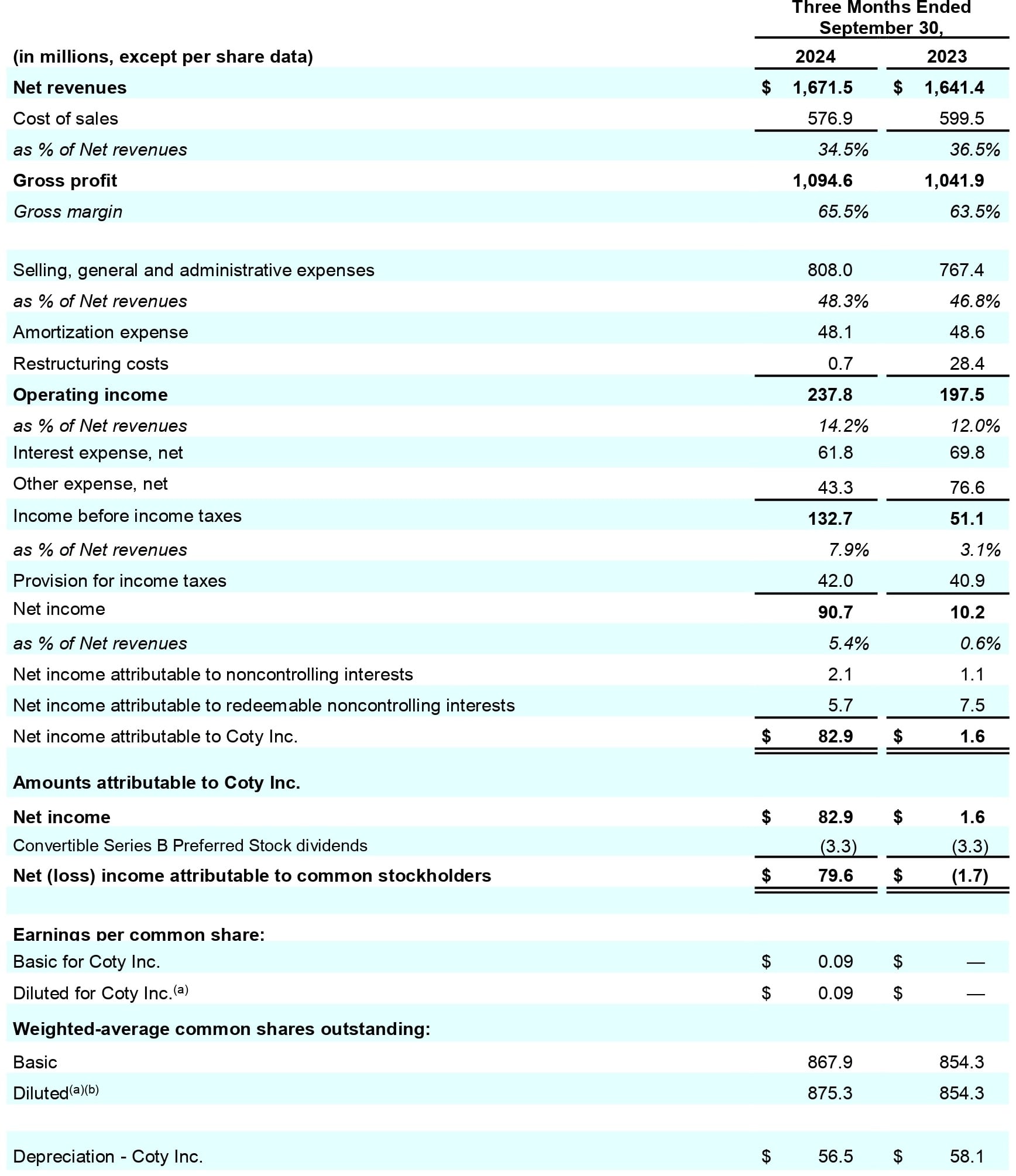
(a) Diluted EPS is adjusted by the effect of dilutive securities, including awards under the Company's equity compensation plans, the convertible Series B Preferred Stock, and the Forward Repurchase Contracts. When calculating any potential dilutive effect of stock options, Series A Preferred Stock, restricted stock, RSUs and PRSUs, the Company uses the treasury method and the if-converted method for the Convertible Series B Preferred Stock and the Forward Repurchase Contracts. The treasury method typically does not adjust the net income attributable to Coty Inc., while the if-converted method requires an adjustment to reverse the impact of the preferred stock dividends of $3.3 and $3.3, respectively, and to reverse the impact of fair market value losses/(gains) for contracts with the option to settle in shares or cash of $24.6 and $44.3, respectively, if dilutive, for the three months ended September 30, 2024 and 2023 on net income applicable to common stockholders during the period.
(b) For the three months ended September 30, 2024, outstanding stock options with rights to purchase 3.5 million shares of Common Stock were anti-dilutive and excluded from the computation of diluted EPS. For the three months ended September 30, 2023, outstanding stock options, Series A Preferred Stock, restricted stock, and RSUs were excluded from the computation of diluted loss per share due to the net loss incurred during the period.
RECONCILIATION OF REPORTED TO ADJUSTED RESULTS FOR THE CONSOLIDATED STATEMENTS OF OPERATIONS
These supplemental schedules provide adjusted Non-GAAP financial information and a quantitative reconciliation of the difference between the Non-GAAP financial measure and the financial measure calculated and reported in accordance with GAAP.
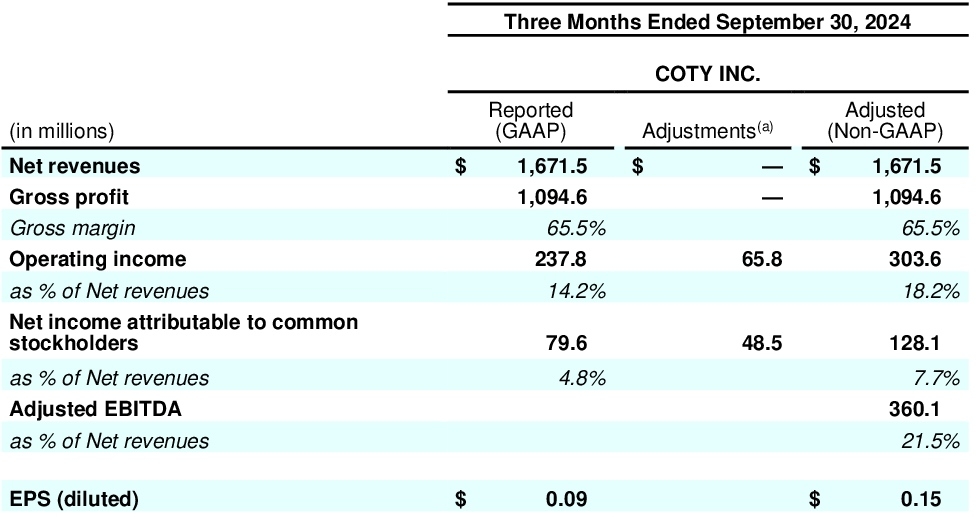
Adjusted diluted EPS includes $0.03 hurt related to the net impact of the Total Return Swaps in the three months ended September 30, 2024.
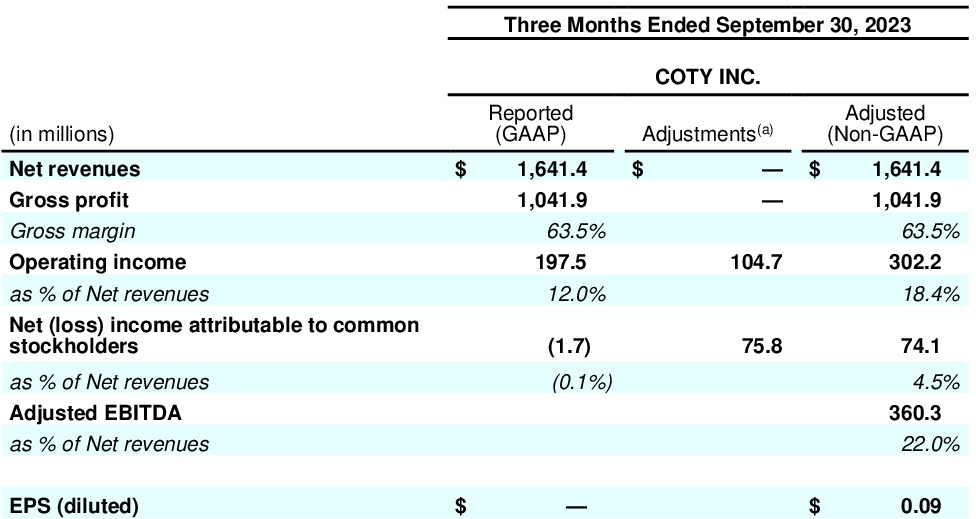
Adjusted diluted EPS includes $0.06 hurt related to the net impact of the Total Return Swaps in the three months ended September 30, 2023.
(a) See “Reconciliation of Reported Net Income, Adjusted Operating Income and Adjusted EBITDA for Coty Inc” and “Reconciliation of Reported Net Income to Adjusted Net Income” for a detailed description of adjusted items.
RECONCILIATION OF REPORTED NET INCOME TO ADJUSTED OPERATING INCOME AND ADJUSTED EBITDA
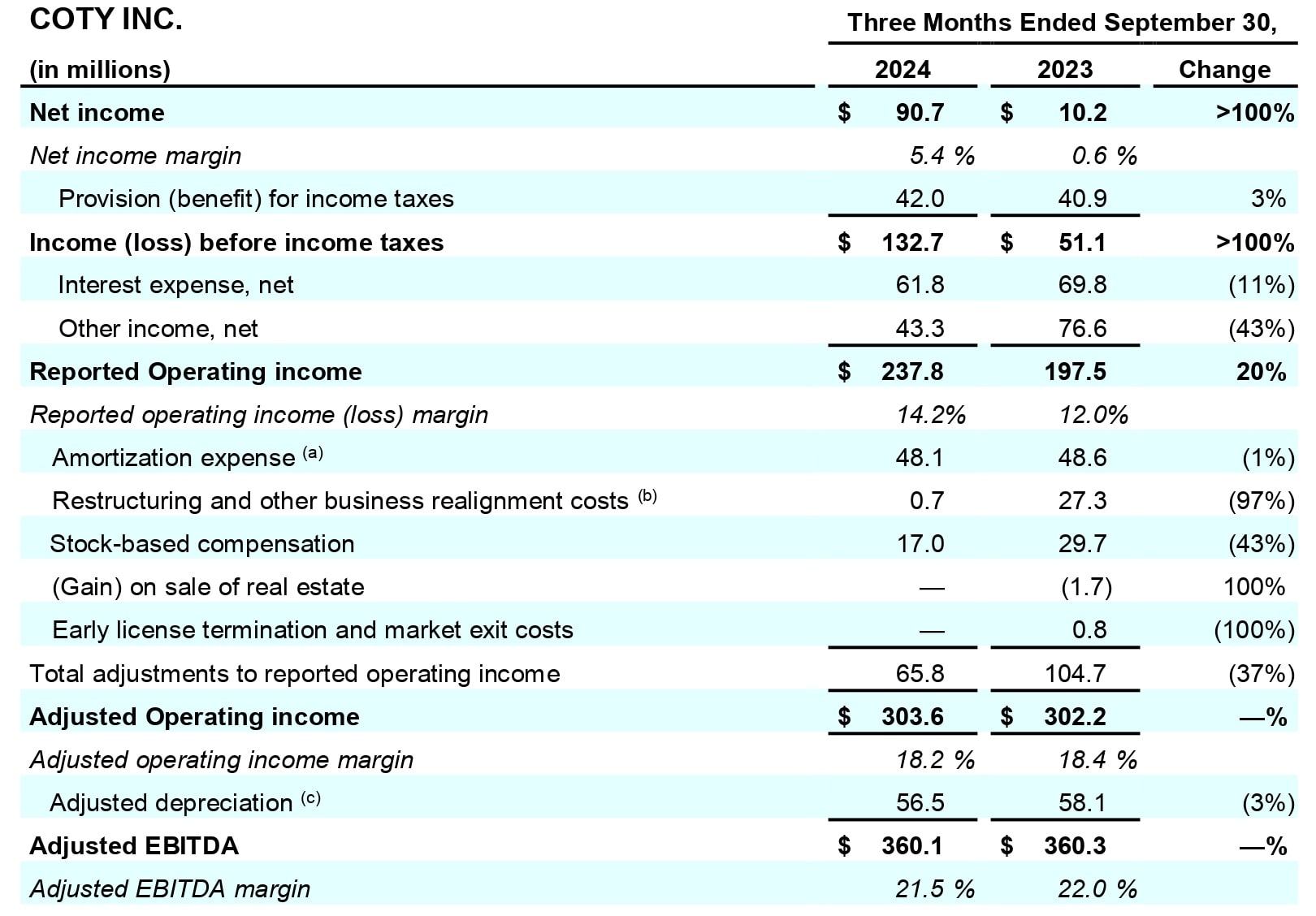
RECONCILIATIONS OF SEGMENT REPORTED OPERATING INCOME (LOSS) TO SEGMENT ADJUSTED OPERATING INCOME (LOSS) AND SEGMENT ADJUSTED EBITDA
OPERATING INCOME, ADJUSTED OPERATING INCOME AND ADJUSTED EBITDA- PRESTIGE SEGMENT
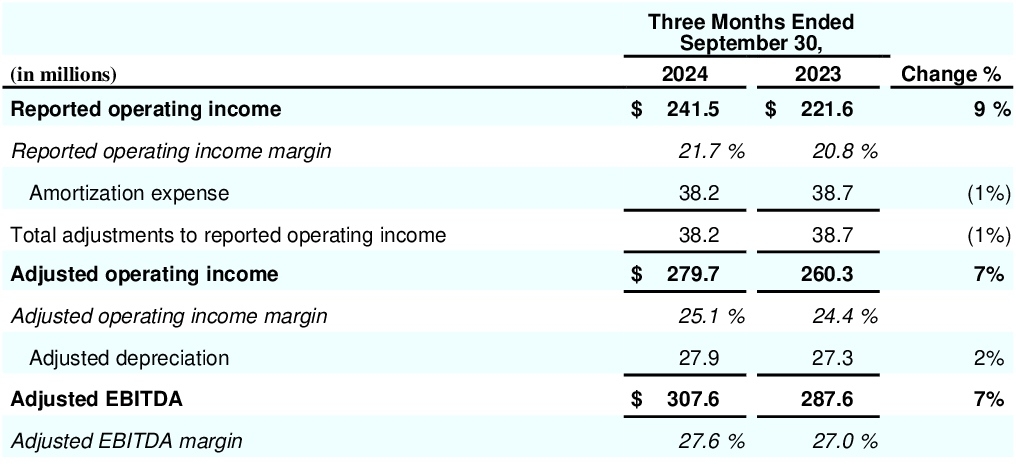
OPERATING INCOME, ADJUSTED OPERATING INCOME AND ADJUSTED EBITDA- CONSUMER BEAUTY SEGMENT
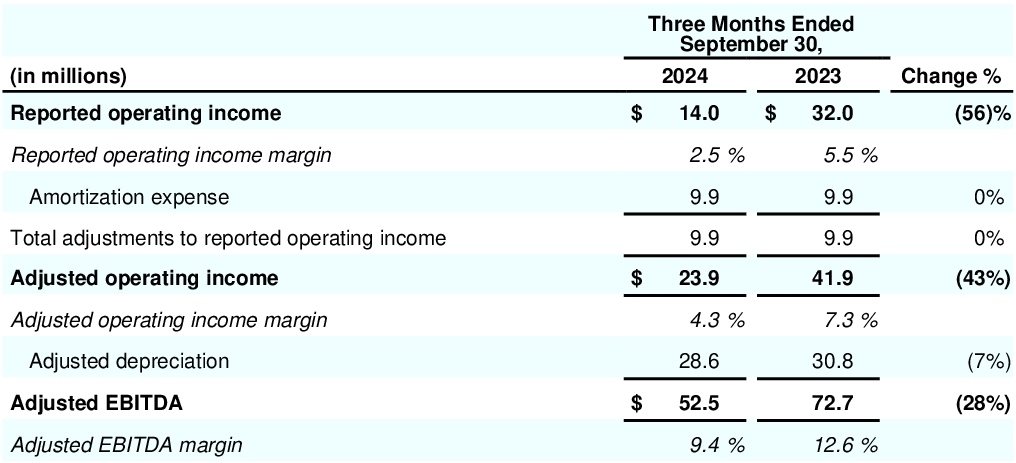
OPERATING LOSS, ADJUSTED OPERATING LOSS AND ADJUSTED EBITDA- CORPORATE SEGMENT
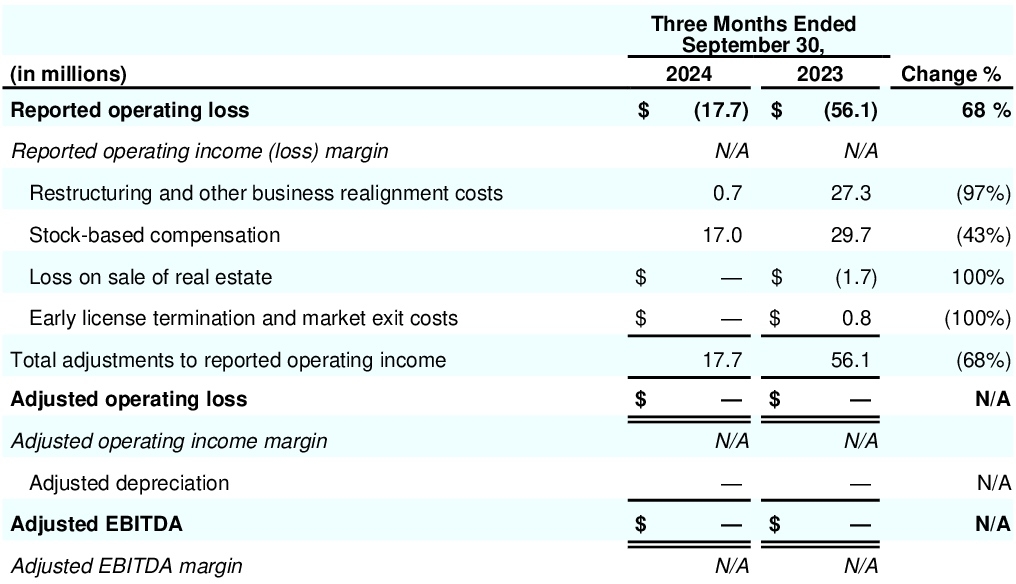
RECONCILIATION OF REPORTED INCOME BEFORE INCOME TAXES AND EFFECTIVE TAX RATES TO ADJUSTED INCOME BEFORE INCOME TAXES AND ADJUSTED EFFECTIVE TAX RATES FOR COTY INC.

The adjusted effective tax rate was 28.9% for the three months ended September 30, 2024 compared to 43.7% for the three months ended September 30, 2023. The differences were primarily due to an expense of $24.3 recognized in the prior period on the revaluation of the Company's deferred tax liabilities due to a tax rate increase enacted in Switzerland.
(a) See a description of adjustments under “Reconciliation of Reported Net Income to Adjusted Operating Income and Adjusted EBITDA for Coty Inc.
(b) The tax effects of each of the items included in adjusted income are calculated in a manner that results in a corresponding income tax expense/provision for adjusted income. In preparing the calculation, each adjustment to reported income is first analyzed to determine if the adjustment has an income tax consequence. The provision for taxes is then calculated based on the jurisdiction in which the adjusted items are incurred, multiplied by the respective statutory rates and offset by the increase or reversal of any valuation allowances commensurate with the non-GAAP measure of profitability.
(c) The amount represents the unrealized (gain) loss recognized for the change in the fair value of the investment in Wella.
(d) For the three months ended September 30, 2024, this primarily represents recovery of previously written-off non-income tax credits and the amortization of basis differences in certain equity method investments. For the three months ended September 30, 2023, this primarily represents divestiture-related costs related to our equity investments and the amortization of basis differences in certain equity method investments.
RECONCILIATION OF REPORTED NET INCOME TO ADJUSTED NET INCOME FOR COTY INC.
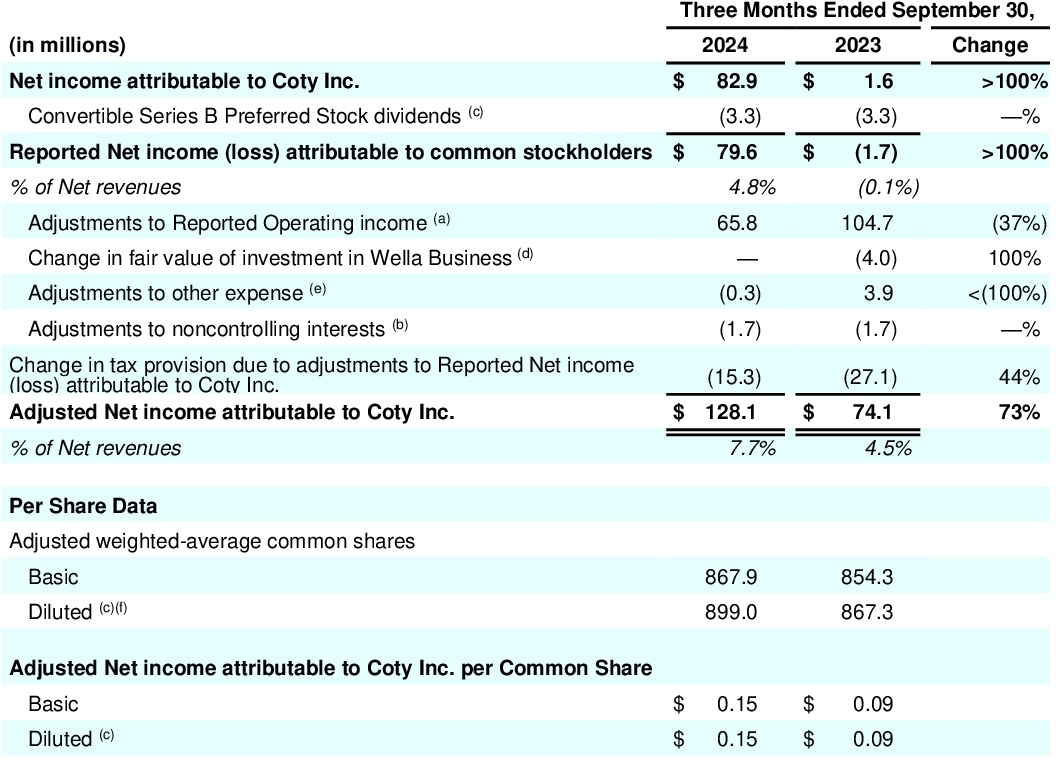
Adjusted diluted EPS includes $0.03 hurt related to the net impact of the Total Return Swaps in the three months ended September 30, 2024. Adjusted diluted EPS includes $0.06 hurt related to the net impact of the Total Return Swaps in the three months ended September 30, 2023.
(a) See a description of adjustments under “Net Income, Adjusted Operating Income and Adjusted EBITDA for Coty Inc.”
(b) The amounts represent the after-tax impact of the non-GAAP adjustments included in Net income attributable to noncontrolling interest based on the relevant noncontrolling interest percentage in the Condensed Consolidated Statements of Operations.
(c) Diluted EPS is adjusted by the effect of dilutive securities, including awards under the Company's equity compensation plans, the convertible Series B Preferred Stock and the Forward Repurchase Contracts, if applicable. When calculating any potential dilutive effect of stock options, Series A Preferred Stock, restricted stock, PRSUs and RSUs, the Company uses the treasury method and the if-converted method for the Convertible Series B Preferred Stock and the Forward Repurchase Contracts. The treasury method typically does not adjust the net income attributable to Coty Inc. while the if-converted method requires an adjustment to reverse the impact of the preferred stock dividends and the impact of fair market value (gains)/losses for contracts with the option to settle in shares or cash, if dilutive, on net income applicable to common stockholders during the period.
(d) The amount represents the unrealized (gain) loss recognized for the change in the fair value of the investment in Wella Company.
(e) For the three months ended September 30, 2024, this primarily represents recovery of previously written-off non-income tax credits and the amortization of basis differences in certain equity method investments. For the three months ended September 30, 2023, this primarily represents divestiture-related costs related to our equity investments and the amortization of basis differences in certain equity method investments.
(f) Adjusted Diluted EPS is adjusted by the effect of dilutive securities. For the three months ended September 30, 2024 and 2023, no dilutive shares of the Forward Repurchase Contracts were included in the computation of adjusted diluted EPS as their inclusion would be anti-dilutive. Accordingly, we did not reverse the impact of the fair market value losses/(gains) for contracts with the option to settle in shares or cash of $24.6 and $44.3, respectively. For the three months ended September 30, 2024, as the Convertible Series B Preferred Stock was dilutive, an adjustment to reverse the impact of the preferred stock dividends of $3.3 was required. For the three months ended September 30, 2023, convertible Series B Preferred Stock (23.7 million weighted average dilutive shares) were anti-dilutive. Accordingly, we excluded these shares from the diluted shares and did not adjust the earnings for the related dividend of $3.3.
RECONCILIATION OF NET CASH PROVIDED BY OPERATING ACTIVITIES TO FREE CASH FLOW

RECONCILIATION OF TOTAL DEBT TO FINANCIAL NET DEBT AND ECONOMIC NET DEBT

1 Total debt is derived from footnote 9 from the Form 10-Q for the quarter-ended September 30, 2024 and includes both the Company's short-term and long-term debt (including the current portion of long-term debt).
RECONCILIATION OF TTM(a) NET INCOME TO TTM ADJUSTED EBITDA
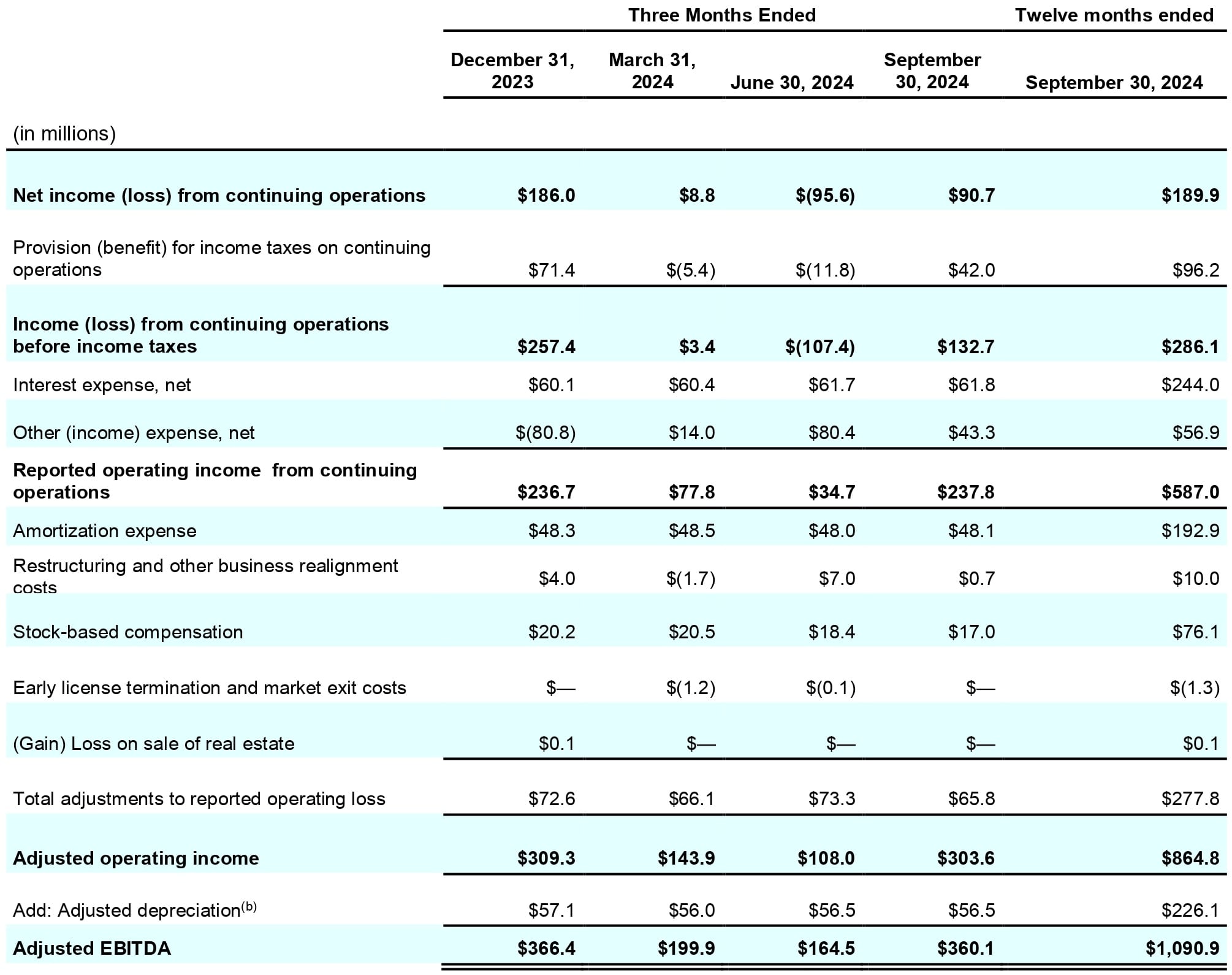
(a) Trailing twelve months (TTM) net income from continuing operations, reported operating income, adjusted operating income, and adjusted EBITDA represents the summation of each of these financial metrics for the quarters ended December 31, 2023, March 31, 2024, June 30, 2024, and September 30, 2024.
(b) Adjusted depreciation for the twelve months ended September 30, 2024 represents depreciation expense for Coty Inc for the period, excluding accelerated depreciation.
COMPARISON OF TOTAL DEBT/NET INCOME FROM CONTINUING OPERATIONS TO FINANCIAL NET DEBT/ADJUSTED EBITDA

(a) TTM Adjusted EBITDA for the twelve months ended September 30, 2024 represents the summation of Adjusted EBITDA for each of the quarters ended September 30, 2024, June 30, 2024, March 31, 2024, and December 31, 2023. For a reconciliation of net income (loss) from continuing operations to Adjusted EBITDA for each of those periods, see the table entitled "Reconciliation of TTM of Net Income to Adjusted Operating Income to Adjusted EBITDA" for each of those periods.
(b) TTM net income from continuing operations for the twelve months ended September 30, 2024 represents the summation of net income from continuing operations for each of the quarters ended September 30, 2024, June 30, 2024, March 31, 2024, and December 31, 2023.
(c) Financial Net Debt equals Total Debt minus Cash and cash equivalents as of September 30, 2024. See table titled "Reconciliation of Total Debt to Financial Net Debt and Economic Net Debt".
(d) Not relevant.
RECONCILIATION OF REPORTED NET REVENUES TO LIKE-FOR-LIKE NET REVENUES

(a) The Company had an early license termination with Lacoste and concluded the sell-off period at the end of the second quarter of fiscal 2024. In calculating the QTD YoY LFL revenue change, to maintain comparability, we have excluded the first quarter of fiscal 2024 Lacoste contribution.
(b) LFL results for the three months ended September 30, 2024 include 1% help from Argentina resulting from significant price increases due to hyperinflation.
COTY INC. & SUBSIDIARIES
CONDENSED CONSOLIDATED BALANCE SHEETS
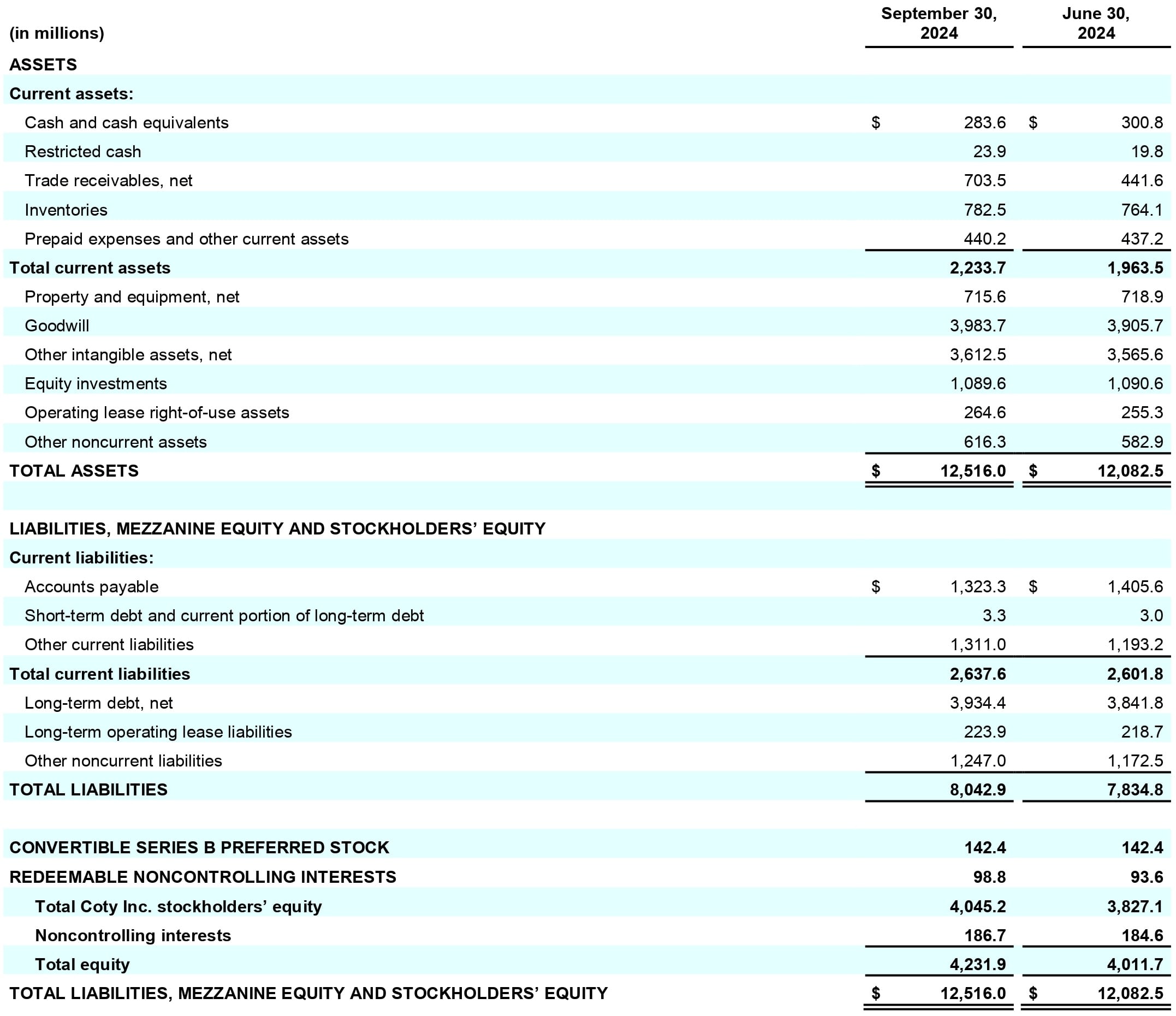
COTY INC. & SUBSIDIARIES
CONDENSED CONSOLIDATED STATEMENTS OF CASH FLOWS
